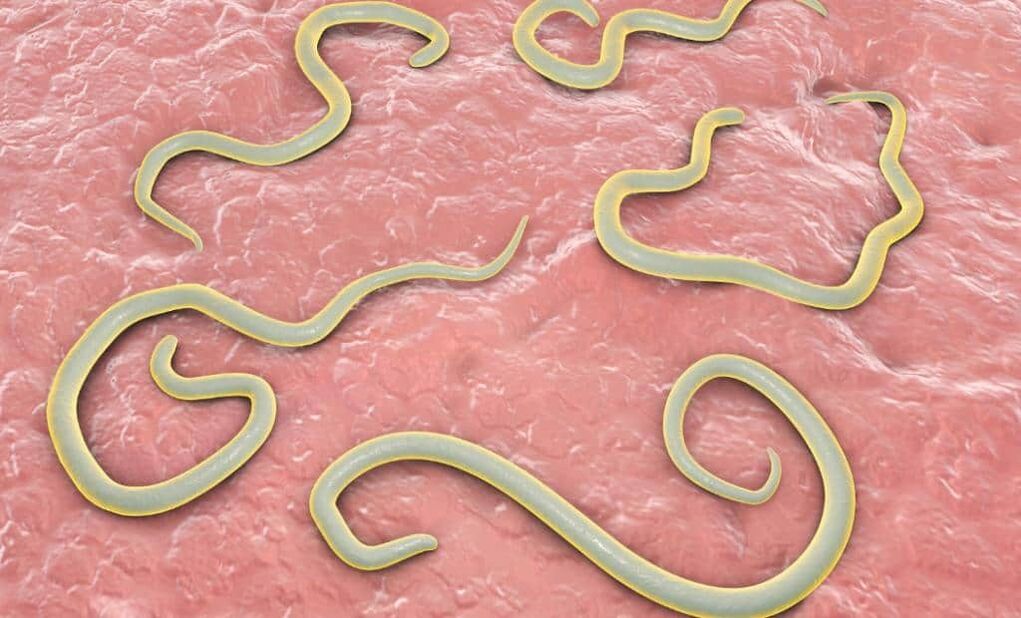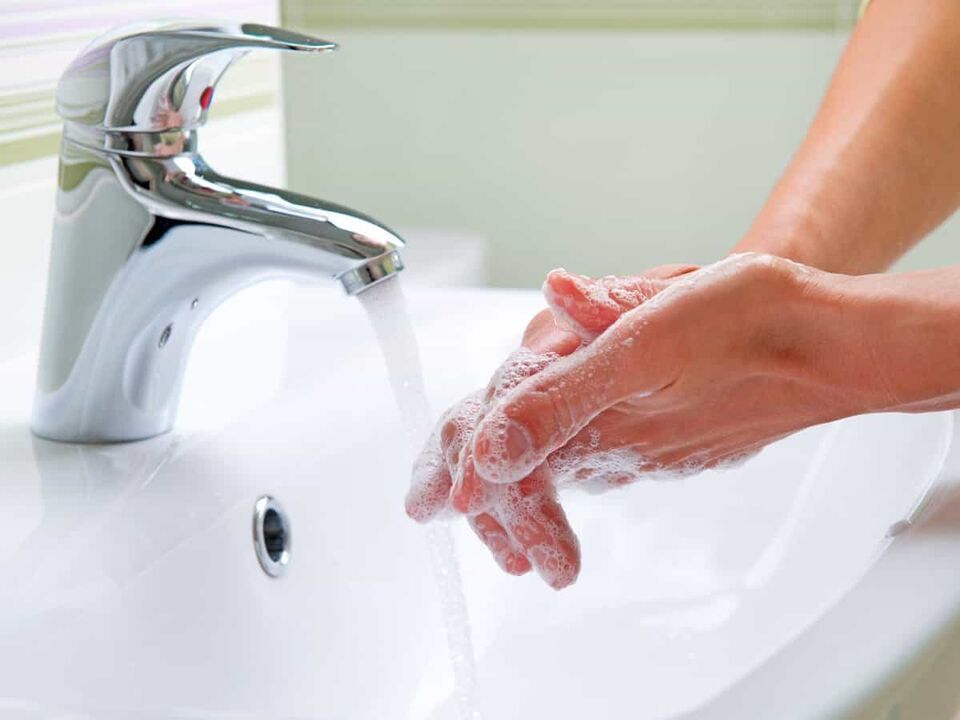Prevention of helminthsis to follow strict rules of hygiene. Most of us do not even realize that we are infected with many parasites. Fatigue, apathy, headaches and poor digestion are most often associated with work or food quality. And few people think that these symptoms may indicate a parasitic infection.
The worst thing is that helminthiasis hides and slowly spoils our health. The risk group includes children whose bodies are often vulnerable to parasites. Therefore, it is very important to prevent worms in a natural way, with the help of immunity.
Helminths and damage to the body
More than 400 species of parasitic worms can cause worm infestation in humans. Infection often occurs through contaminated food and water, and less frequently helminths enter the body through the skin.

Depending on the route of infection, parasites are divided into 3 groups:
- biohelminths- by food (echinococcus, bovine and pork tape);
- geohelminths- feces, household items, sometimes with water-contaminated hands (whip, corn, roundworm);
- contact worms- in personal contact with an infected person, less often with self-infection (pinworms, dwarf tapeworm).
According to the structure of the body, parasites are divided into the following types:
- round (nematodes);
- lent (cestodes);
- flukes (has strong nipples and a flat body).
The risk group includes children attending preschools, agricultural workers, immunocompromised patients, the elderly and the elderly. Pets can also be at risk for infection.
In adults, helminthiasis is often latent (latent), has an elongated course, and manifests itself with various clinical signs disguised as various pathologies. Children are characterized by an acute course with bright symptoms associated with the characteristics of the immune system.
Helminths use the human body as a source of food, habitat and reproduction. Instead, by releasing the products of their vital activity, worms cause systemic toxic damage to human organs and systems.
For example, the larvae of corn worms secrete anticoagulants to maintain blood circulation. A. duodenale alone is estimated to cause 0. 2 ml of blood loss per day. It is enough to have 25 helminths in the body for 5 ml of blood loss. But usually more than that. As a result, the infected person has severe anemia.
According to numerous studies, helminthic invasions have a negative impact on the more frequent development of somatic diseases, exacerbation of chronic pathologies, the body of the host, including his immune system.
A feature of most helminthiases is the long-term presence of the pathogen in the body and a chronic course associated with recurrent infections. In children, helminthiasis is often accompanied by various non-specific symptoms: weakness, fatigue, irritability, sleep disturbances, dyspepsia, stunted growth and weight gain, decreased immunity.
Diseases caused by helminths reduce the ability to work and worsen the quality of life.
The role of immunity against helminths
The immune system is the guardian of our health. Protects body from viruses, bacteria & parasitesUnfortunately, immunity is a little worse than the latter. This is especially true for children. The child's defenses are underdeveloped, and helminthic infestations further weaken the body's resistance to infections. Therefore, prevention of helminths is very important for children.

Antiparasitic immunity is similar to antibacterial immunity. Both cellular and humoral connections are involved in protection against helminths. The first barrier for attackers is the skin and mucous membranes. More often, worms enter the body through the digestive system. The mucous membranes of the stomach and intestines contain immune cells that trigger a cascade of reactions to reject the parasite and expel it from the body.
The problem is that helminths have their own defense mechanisms, which often allow them to easily overcome the first obstacle.
Immunity to helminths is divided into primary and secondary. The key is a genetically determined defense factor for human birth. It is formed after secondary infection during life and during the production of specific antibodies against a particular type of parasite.
The recently discovered TSLP (Thymus Stromal Lymphopoietin) has aroused great interest among scientists. Due to its unique properties, cytokines play an important role in protecting the body from worms. Depending on the nature of the infection, TSLP can enhance or suppress immune responses regulated by two types of T-lymphocytes.
The likelihood of infection depends mainly on innate immunity and the health of the immune system as a whole, the effectiveness is always individual and depends on the type of worm.
The proper functioning of the immune system depends on our nutrition, if the body does not have the vitamins and minerals needed to build immune cells, then the reaction to infections will be weak and the fight will end in defeat.
Immunity requires the biologically active substances that come with food. In case of chronic stress or illness, it is important to support the immune system with vitamins and trace elements, because the body uses all the nutrients, as well as herbs to strengthen the nervous system. And only in extreme cases, seek medical treatment.
How does immunity against worms work?
Primary immunity to helminths can work in several ways:
- The parasite adapts to the internal environment of the host organism, grows well, develops and multiplies. The immune response is minimal. In such cases, helminthiasis is long-lasting, sometimes difficult. For example, the invasion of dwarf tapeworm.
- There is a moderate immune response to helminths. This limits the worm's productivity. For example, a round worm.
- The protective reaction that prevents the full development of the parasite is well expressed. The worm does not reach sexual maturity, but can be harmful to health. The disease is short-lived or undergoes a latent course.
- Effective primary immunity stops the entry of parasites in the stage of skin and mucous membranes. As a result, helminths do not penetrate the internal organs and do not harm health.
Secondary immunity helps the body to respond more quickly and more effectively to repeated helminthic invasions. This prevents the development of worms in the early stages of infection and reduces the toxic effects. The protective reaction is based on the presence of antibodies (immunoglobulins) against this type of helminths in the blood.
The main links of immune defense against parasitic invasion:
- the reaction of the tissues of the internal organs, which leads to the isolation (formation of a capsule) and destruction of worms;
- Production of class A and E immunoglobulins;
- changes in hormonal activity, especially estrogens in women and men;
- hereditary factor (antiparasitic primary immunity).
An indicator of infection is a high content of eosinophils in the blood, which indicates an allergic reaction. The second important point is the sharp increase in the concentration of immunoglobulin E in the absence of food intolerance.
Important prevention rules
Immunity fights the entry of parasites in different ways, is not always effective enough. Our task is to help the body prevent the threat of alien invasion. Preventive measures must be taken at all times and without exception.
To minimize the risk of infection, parents should teach their children the rules of personal hygiene from an early age.
Preventive measures are simple and accessible to everyone, while eliminating the danger of helminthic invasion completely (or almost completely). However, even if all necessary precautions are taken, doctors recommend that groups at risk be given additional prophylaxis with medications. When infection is suspected or worms are detected at the time of diagnosis, medications are also prescribed by a doctor.
Rules for the prevention of helminthiasis:
- Buy meat and fish products in designated places. Vendors must have a quality certificate and a health certificate.
- Cook enough food. Follow the rules of salting, canning and salting.
- For boiled tap or filtered water.
- Wash vegetables and fruits under running water before use. Greens can be washed first in soapy water and then in clean water. Strawberries are immersed in 1% soda solution. After washing the berries thoroughly with running water. It is recommended to first soak heavily contaminated vegetables in a weak iodine solution (not more than 0. 3%).
- Follow the rules of personal hygiene. Wash your hands with soap and water after using the toilet, after working outdoors, in the garden, and after each contact with animals, including pets.
- Regularly clean the area with disinfectants, especially in the bathroom and kitchen.
- Clean pets of worms according to the veterinary schedule (usually 1-2 times a year).
- During enterobiasis, pay special attention to hand and nail hygiene, wash the child at night and in the morning, change pre-ironed underwear and bedding with an iron every time. This prevents re-infection.
- It is important to lead a healthy lifestyle to strengthen and protect your immune system. Rational nutrition, regular physical activity, proper response to stress, giving up bad habits will reduce the risk of parasitic infections.
- Chemoprophylaxis 1-2 times a year according to the scheme prescribed by a doctor.

Medicines for worms are taken in pill form.This is a chemoprophylaxis aimed at destroying parasites that can enter the body but do not have time to react from the internal organs.
They have an anthelmintic effectpumpkin seeds.You can chop the seeds before eating and mix them with a little honey. The daily dose for adults is 300 grams for children, depending on age. Up to 4 years - 80 grams, up to 7 years - 100 grams, up to 10 years - 150 grams, up to 15 years - 200 grams. After 3 hours, take a laxative.
Prevention of helminthiasis includes strengthening the immune system, following the rules of personal hygiene and culinary processing of products. By following simple rules, we can protect ourselves from being infected by worms. Annual chemoprophylaxis helps our immune system to cope with an external attack.
Talk to your doctor before taking anthelmintic medication. The specialist will choose the remedy that is right for you and give recommendations on the treatment regimen. Uncontrolled intake can not only be useless, but also harmful to your health. Do not forget.
An excellent alternative to pills are herbs from worms.



























